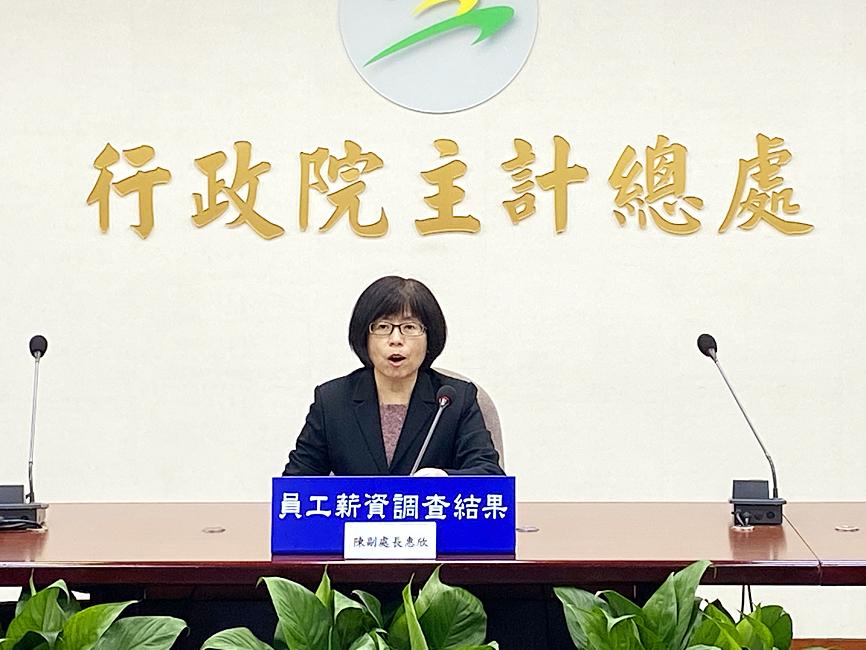Average monthly take-home pay in June rose 1.41 percent from a year earlier to NT$42,352, while total wages including overtime and performance-based compensation increased 4.09 percent to NT$50,581, the Directorate-General of Budget, Accounting and Statistics (DGBAS) said yesterday.
The data represented a pickup from May, as the effects of the COVID-19 pandemic subsided in Taiwan and most companies began recovering from the outbreak, the statistics agency said.
The improvement is also evidenced by an enlarged job pool — the workforce expanded slightly by 0.08 percent to 7.9 million — the first increase since the virus broke out in late January, DGBAS Deputy Director Chen Hui-hsin (陳惠欣) told a news briefing in Taipei.

Photo: Clare Cheng, Taipei Times
“The [employment] situation reported the first positive movements in June after seeing job losses between February and May,” Chen said.
A recovery in shopping activity and domestic trips lent support, she added.
Compared with a year earlier, the total number of people employed was 0.42 percent lower, the steepest decline in 11 years, indicating that the market has not completely returned to normal, Chen added.
Service-oriented sectors put up a better recovery, especially restaurants, hotels and entertainment facilities, which have benefited from pent-up demand, she said.
The manufacturing industry continued to cut payroll by 7,000, raising cumulative job losses to 25,000, mainly among machinery, metal and textile businesses, she added.
It is not clear when the manufacturing industry will come out of the woods, as uncertainty is building up due to renewed US-China trade tensions and the resurgence of virus infections in many countries, Chen said.
By sector, airline employees had the highest monthly take-home pay at NT$65,728, while workers at financial and insurance companies enjoyed the highest total wages at NT$84,405, aided by the distribution of bonuses, the agency said.
People worked an average of 168 hours in June, an increase of 5.4 hours from one month earlier, the agency said.
Overtime pay averaged NT$1,675, a drop of 2.73 percent from May, it said.
For the first six months of this year, average take-home pay advanced 1.47 percent to NT$42,277 per month, while total wages increased 1.03 percent to NT$57,505 per month, it said.
The figures rose 1.7 percent and 1.25 percent respectively after factoring in a decrease in inflation, it added.

GROWING OWINGS: While Luxembourg and China swapped the top three spots, the US continued to be the largest exposure for Taiwan for the 41st consecutive quarter The US remained the largest debtor nation to Taiwan’s banking sector for the 41st consecutive quarter at the end of September, after local banks’ exposure to the US market rose more than 2 percent from three months earlier, the central bank said. Exposure to the US increased to US$198.896 billion, up US$4.026 billion, or 2.07 percent, from US$194.87 billion in the previous quarter, data released by the central bank showed on Friday. Of the increase, about US$1.4 billion came from banks’ investments in securitized products and interbank loans in the US, while another US$2.6 billion stemmed from trust assets, including mutual funds,

AI TALENT: No financial details were released about the deal, in which top Groq executives, including its CEO, would join Nvidia to help advance the technology Nvidia Corp has agreed to a licensing deal with artificial intelligence (AI) start-up Groq, furthering its investments in companies connected to the AI boom and gaining the right to add a new type of technology to its products. The world’s largest publicly traded company has paid for the right to use Groq’s technology and is to integrate its chip design into future products. Some of the start-up’s executives are leaving to join Nvidia to help with that effort, the companies said. Groq would continue as an independent company with a new chief executive, it said on Wednesday in a post on its Web

JOINT EFFORTS: MediaTek would partner with Denso to develop custom chips to support the car-part specialist company’s driver-assist systems in an expanding market MediaTek Inc (聯發科), the world’s largest mobile phone chip designer, yesterday said it is working closely with Japan’s Denso Corp to build a custom automotive system-on-chip (SoC) solution tailored for advanced driver-assistance systems and cockpit systems, adding another customer to its new application-specific IC (ASIC) business. This effort merges Denso’s automotive-grade safety expertise and deep vehicle integration with MediaTek’s technologies cultivated through the development of Media- Tek’s Dimensity AX, leveraging efficient, high-performance SoCs and artificial intelligence (AI) capabilities to offer a scalable, production-ready platform for next-generation driver assistance, the company said in a statement yesterday. “Through this collaboration, we are bringing two

Even as the US is embarked on a bitter rivalry with China over the deployment of artificial intelligence (AI), Chinese technology is quietly making inroads into the US market. Despite considerable geopolitical tensions, Chinese open-source AI models are winning over a growing number of programmers and companies in the US. These are different from the closed generative AI models that have become household names — ChatGPT-maker OpenAI or Google’s Gemini — whose inner workings are fiercely protected. In contrast, “open” models offered by many Chinese rivals, from Alibaba (阿里巴巴) to DeepSeek (深度求索), allow programmers to customize parts of the software to suit their